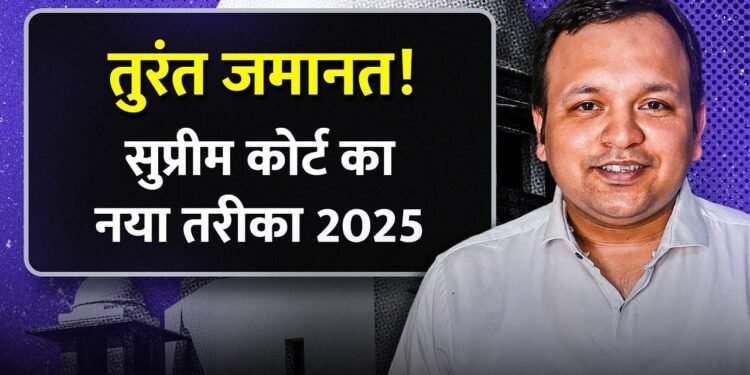Introduction
In a significant ruling that sheds light on the delicate balance between individual liberty and the efficient administration of justice, the Supreme Court of India, in Subhelal @ Sushil Sahu vs. The State Of Chhattisgarh (2025), has provided a comprehensive interpretation of Section 437(6) of the Code of Criminal Procedure (CrPC). This judgment is not merely a procedural clarification; it is a reaffirmation of the principles that underpin the criminal justice system, particularly concerning the right to a speedy trial and the exercise of judicial discretion in bail matters. Through this ruling, the apex court has sought to address the persistent issue of prolonged undertrial detention, while also ensuring that the interests of justice are not compromised. The judgment is a testament to the court’s commitment to upholding the constitutional mandate of protecting personal liberty, while simultaneously acknowledging the complexities inherent in criminal trials.
To learn more about the topic, read the blog till the end, and if there lies any more doubt, feel free to reach out to us at; https://thelegalshots.com/legal-opinion/
Facts of the Case
The case of Subhelal @ Sushil Sahu revolved around allegations of a substantial financial fraud involving cryptocurrency, where an estimated ₹4 Crore was misappropriated, impacting nearly 2000 investors. The appellant, along with other co-accused, faced charges under Sections 420 (cheating), 201 (causing disappearance of evidence), 120-B (criminal conspiracy), and 34 (acts done by several persons in furtherance of common intention) of the Indian Penal Code (IPC). The trial, conducted before the Chief Judicial Magistrate, Raipur, was marked by significant delays, primarily due to the prosecution’s intention to examine a staggering 189 witnesses. Despite the filing of a charge sheet and the commencement of the trial, only one witness had been examined, indicating a potentially protracted legal process. The appellant had been in custody since December 2023, and the trial’s slow progress raised concerns about the fairness of his continued detention, especially considering the Magistrate’s limited sentencing power of 7 years. This scenario provided the Supreme Court with an opportunity to examine the application of Section 437(6) CrPC in the context of economic offenses and protracted trials.
Laws Involved
- Section 437(6) CrPC: This provision allows for the release of an accused on bail if the trial is not concluded within 60 days from the first date fixed for taking evidence, unless the Magistrate records reasons for not doing so.
- Sections 420, 201, 120-B, and 34 IPC: These sections pertain to cheating, causing disappearance of evidence, criminal conspiracy, and acts done by several persons in furtherance of common intention, respectively.
Supreme Court’s Interpretation
The Supreme Court clarified the following aspects of Section 437(6) CrPC:
- Discretion, Not Mandatory: While the provision aims to expedite trials and protect liberty, it does not grant an absolute right to bail. The Magistrate retains discretion to refuse bail by recording reasons.
- Balancing Rights: The provision balances the accused’s right to a speedy trial with the interests of justice.
- Relevant Factors: The Court outlined factors to be considered:
- Whether the trial delay is attributable to the accused.
- Whether there’s a risk of tampering with evidence or absconding.
- Whether the accused was in custody during the relevant period.
- The severity of the offense and the likely trial duration.
- Liberal Approach: Courts should adopt a liberal approach, especially in cases with documentary evidence, no fault of the accused in delay, and a substantial period of custody.
- Deposit Condition: In this specific case, considering the economic offense, the court imposed a condition to deposit 35 lakh rupees.
Key Takeaways
The judgment in Subhelal @ Sushil Sahu offers several key takeaways:
- Discretion, Not Mandate: Section 437(6) CrPC grants discretionary power to Magistrates, not an absolute right to bail.
- Balancing Act: The provision balances the right to a speedy trial with the interests of justice.
- Weighty Reasons: Refusal of bail under Section 437(6) CrPC requires stronger reasons than at the initial stage.
- Relevant Factors: Courts must consider trial delay attribution, risk of tampering/absconding, custody duration, and offense severity.
- Liberal Approach: Courts should be liberal in cases with documentary evidence and no accused-caused delays.
- Deposit Conditions: in certain cases, especially with large economic crimes, the court may add deposit conditions.
Conclusion: A Step Towards Fairer Trials
The Supreme Court’s ruling in Subhelal @ Sushil Sahu is a significant step towards ensuring fairer trials and preventing prolonged undertrial detention. By clarifying the interpretation of Section 437(6) CrPC, the court has provided valuable guidance to Magistrates and ensured that the provision is applied in a manner that upholds both individual liberty and the interests of justice. This judgment underscores the importance of a balanced approach to bail matters, recognizing that the right to a speedy trial is an integral part of the right to life and personal liberty.
Related Landmark Judgments
- Sanjay Chandra vs CBI (2012) – Bail in economic offences.
- State of Maharashtra vs Sitaram Popat Vetal (2004) – Considerations for granting bail.
- Hussainara Khatoon vs State of Bihar (1979) – Right to a speedy trial.
- Arnesh Kumar vs State of Bihar (2014) – Guidelines for arrest and detention.
- Nehul Prakashbhai Shah v. State of Gujarat (2012): Extensively discussed Section 437(6) CrPC
- Satender Kumar Antil v. CBI (2022): The “Antil Trilogy” on bail jurisprudence.
If doubts still persist, contact our Legal Experts at https://thelegalshots.com/legal-opinion/




